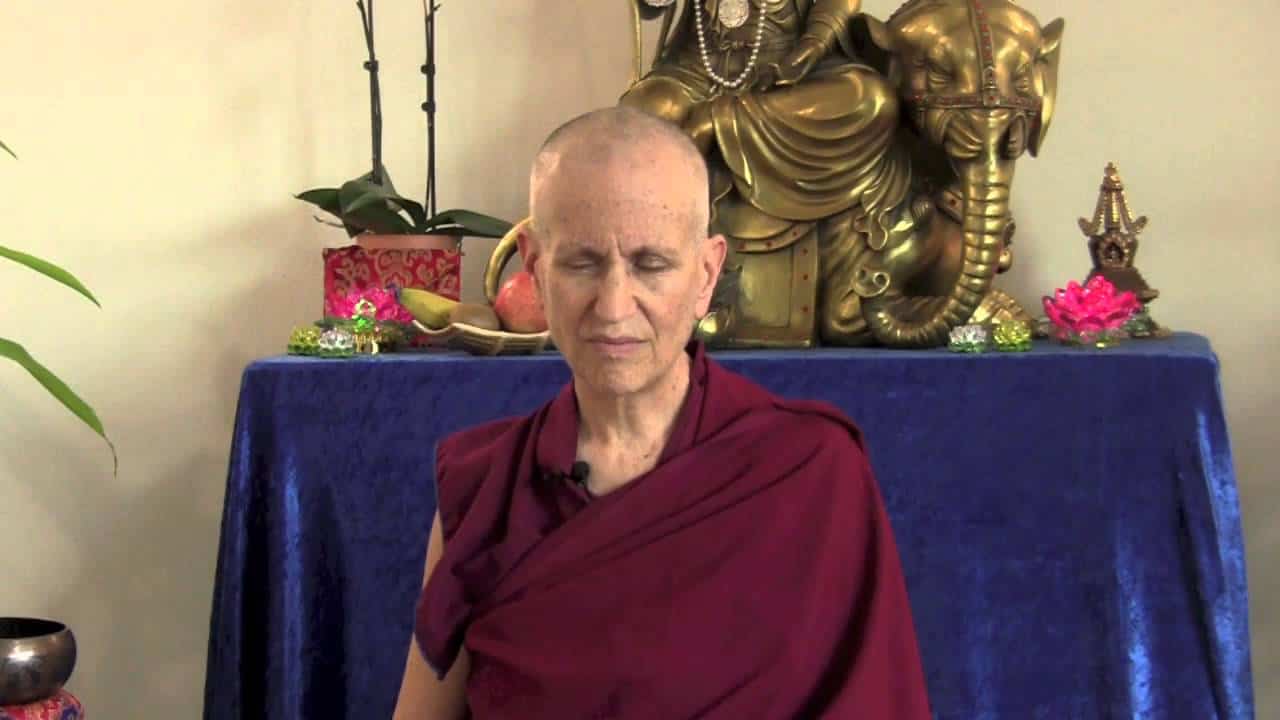Verse 78: The mind of equanimity
Part of a series of talks on Gems of Wisdom, a poem by the Seventh Dalai Lama.
- A mind of impartiality, open and receptive with everybody
- Benefiting others according to their needs and dispositions
- How receptive we are to the benefit of the buddhas and bodhisattvas depends on us
- Having the motivation, but also the skillful means, to be of benefit
Gems of Wisdom: Verse 78 (download)
Who is like a rain cloud enriching everything both near and far?
One who holds the mind in the thought of bringing only benefit and joy to the world.
A rain cloud pours the rain equally—well, more or less equally—over the area. The rain just falls there. And the rain doesn’t discriminate, “Oh, I want to water that plant but I want that plant to die so I’m not going to fall over there.” Similarly here, somebody who “holds the mind in the thought of bringing only benefit and joy to the world,” has the mind of impartiality or equanimity that is open and receptive and concerned with everybody.
Most of us are quite partial. If somebody’s nice to us we like them. We want to help those who are near and dear. If somebody is mean to us we don’t like them, and we don’t want to help them or do anything for them. And then the people who don’t affect us one way or another, nah, we don’t care about.
Here, when they’re talking about a bodhisattva or a buddha, it’s somebody who has eliminated that kind of partiality, and instead can look at everybody and see that in everybody’s heart they’re exactly the same, wanting happiness, not wanting suffering. That they’re exactly the same in having been kind to us in previous lives, and in this life, and they will be kind to us in the future. So with that mind of equanimity then a bodhisattva or a buddha goes about working to benefit others according to what individuals need at that particular time and also according to that individual’s receptivity.
Although the buddhas and bodhisattvas from their side have an equal attitude towards us, and although their motivation to be of benefit extends equally, and that’s not going to change, from our side we are different. When we are in a bad mood, when we’re angry, when we’re defiant, when we’re arrogant, then very difficult for the buddhas to benefit us because we’re completely immersed in our own self-centered ego. That kind of would be like the plant out there putting a raincoat on. [laughter] And basically starving itself from the rain that it desperately needs, you know, how sentient beings do.
And then also, because sentient beings have different dispositions, the buddhas help us according to our disposition. So people who are inclined towards the hearer vehicle, he teaches those teachings. Toward the solitary realizer vehicle he teaches those. Towards the bodhisattva vehicle he teaches those. So while the way of interacting with each being may be different, the mind that cares about each being is the same.
That’s the kind of thing we want to develop in ourselves, that mind that equally cares for everybody, but also the mind that can tune into individuals and see where people are at and what is it good to say to this person, and what should we not say to them that will only cause doubt or wrong views.
It’s not sufficient just to have a good motivation. We really need wisdom and skillful means as well to be able to benefit everybody. So it’s a work in progress.
[In response to audience] But when you hear teachings like this what I get out of it is two things:
-
These are the qualities of the buddhas, who are the Buddha Jewel that we take refuge in. And the same qualities (but to a lesser degree) of the bodhisattvas, the Sangha that we take refuge in. The arya bodhisattvas. So when I hear things like this it gives me something to think about when I meditate on refuge, in terms of understanding the qualities of the objects of refuge.
-
And it also gives me something to think about when I’m generating my motivation for doing the practice. Like what kind of qualities do I want to be able to cultivate, and what’s the advantage of all these different qualities if I really want to help others. And then what are the causes for these different qualities.
Verses like this help when you’re meditating on refuge. They’re also helping when you’re setting your intention and deciding how you want to practice and what you want to cultivate.
Venerable Thubten Chodron
Venerable Chodron emphasizes the practical application of Buddha’s teachings in our daily lives and is especially skilled at explaining them in ways easily understood and practiced by Westerners. She is well known for her warm, humorous, and lucid teachings. She was ordained as a Buddhist nun in 1977 by Kyabje Ling Rinpoche in Dharamsala, India, and in 1986 she received bhikshuni (full) ordination in Taiwan. Read her full bio.


